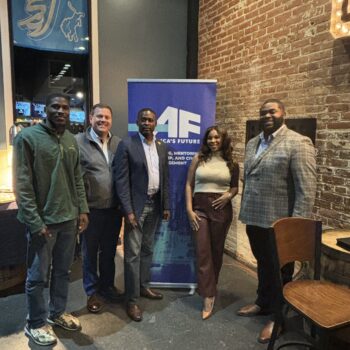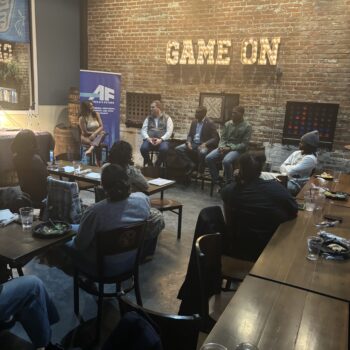AF-Detroit Recaps the 2024 Election
Our AF-Detroit chapter recently met to recap local election results and discuss how members can ensure their voices continue to make an impact. They were joined by several prominent members of the community for a panel discussion. Read more about the event from AF-Detroit Chapter Leader Elijah Richardson below:
The event brought together insightful perspectives from Doug Tietz, Eric Brown, and Jadantae Smith, moderated by Asianae Gunn. The discussion focused on key developments in Detroit’s political landscape, particularly surrounding the mayoral race and voter turnout, with an emphasis on issues important to young voters in the Metro Detroit area.

A central topic of discussion was Detroit Mayor Mike Duggan’s announcement that he will not seek re-election. Instead, he plans to run for Governor of Michigan, a move that has sparked significant political attention across the region. The panel delved into how this decision could reshape the mayoral race, with five current Detroit City Council members already stepping forward as potential candidates for the open mayoral seat. The conversation explored the potential candidates’ platforms, and the implications of Duggan’s departure for the city’s political future.
As the race for Detroit’s next mayor heats up, the panel discussed how the field of City Council members running for mayor could affect the political dynamics in the city. With multiple Council members vying for the mayor’s seat, this race could lead to significant shifts in policy direction, especially given the current power structure and how these candidates have been involved in shaping city policy thus far. The panel explored how each of these candidates is positioning themselves to address Detroit’s most pressing issues, including crime, housing, and economic development.
 A significant portion of the discussion focused on voter turnout, particularly among younger voters in Metro Detroit, and how it compares to past elections. Panelists noted that, while turnout has historically been a challenge, this election cycle has seen an increase in participation among younger generations. Factors contributing to this shift include greater political engagement, targeted outreach by campaigns, and social media mobilization. The panelists also discussed how national political trends, especially those surrounding economic issues, racial justice, and climate change are resonating with young voters in the region. Asianae Gunn led the conversation on the most important issues for young voters in Metro Detroit during the 2024 election. Panelists agreed that economic opportunities, education, and affordable housing were top concerns, with many young voters looking for policies that will create job opportunities and improve the accessibility of quality education. There was also strong sentiment around policies for recent graduates needing housing assistance while they start their careers.
A significant portion of the discussion focused on voter turnout, particularly among younger voters in Metro Detroit, and how it compares to past elections. Panelists noted that, while turnout has historically been a challenge, this election cycle has seen an increase in participation among younger generations. Factors contributing to this shift include greater political engagement, targeted outreach by campaigns, and social media mobilization. The panelists also discussed how national political trends, especially those surrounding economic issues, racial justice, and climate change are resonating with young voters in the region. Asianae Gunn led the conversation on the most important issues for young voters in Metro Detroit during the 2024 election. Panelists agreed that economic opportunities, education, and affordable housing were top concerns, with many young voters looking for policies that will create job opportunities and improve the accessibility of quality education. There was also strong sentiment around policies for recent graduates needing housing assistance while they start their careers.
The event wrapped up with a thoughtful reflection on the potential implications of the 2024 elections in Metro Detroit. Panelists emphasized the importance of engaging young voters and addressing their concerns through effective policy. As the region looks ahead, the decisions made in these upcoming elections will likely have lasting effects on the city’s political and economic landscape. Whether these changes lead to greater unity or further polarization will depend largely on how local leaders choose to engage with the diverse needs of their constituents and navigate the complex challenges facing Metro Detroit.
